HRM in the Service Sector: Travelodge Hotel Case Study Report
VerifiedAdded on 2020/11/23
|14
|4542
|236
Report
AI Summary
This report provides a comprehensive analysis of Human Resource Management (HRM) within Travelodge Hotels Limited, a major player in the UK's budget hotel sector. The report begins by highlighting the significance of HRM in the service industry, emphasizing its crucial role in employee satisfaction and customer loyalty. It then delves into Travelodge's HRM practices, including its human resource planning process, which involves setting objectives, analyzing current manpower, forecasting supply and demand, and implementing action plans. The report also evaluates the current state of employment relations within the UK's service sector, discussing grievance procedures, collective bargaining, and employee participation. Furthermore, it examines the impact of various employment laws, such as the Equality Act 2010 and the Health and Safety at Work Act 1974, on Travelodge's HRM strategies. The report includes a job description and person specification for a Front Office Manager, compares the selection processes of Travelodge and British Airways, and assesses the contribution of training and development activities to the hotel's effective operations. Finally, the report concludes with a summary of the key findings and their implications for Travelodge's future HRM practices.
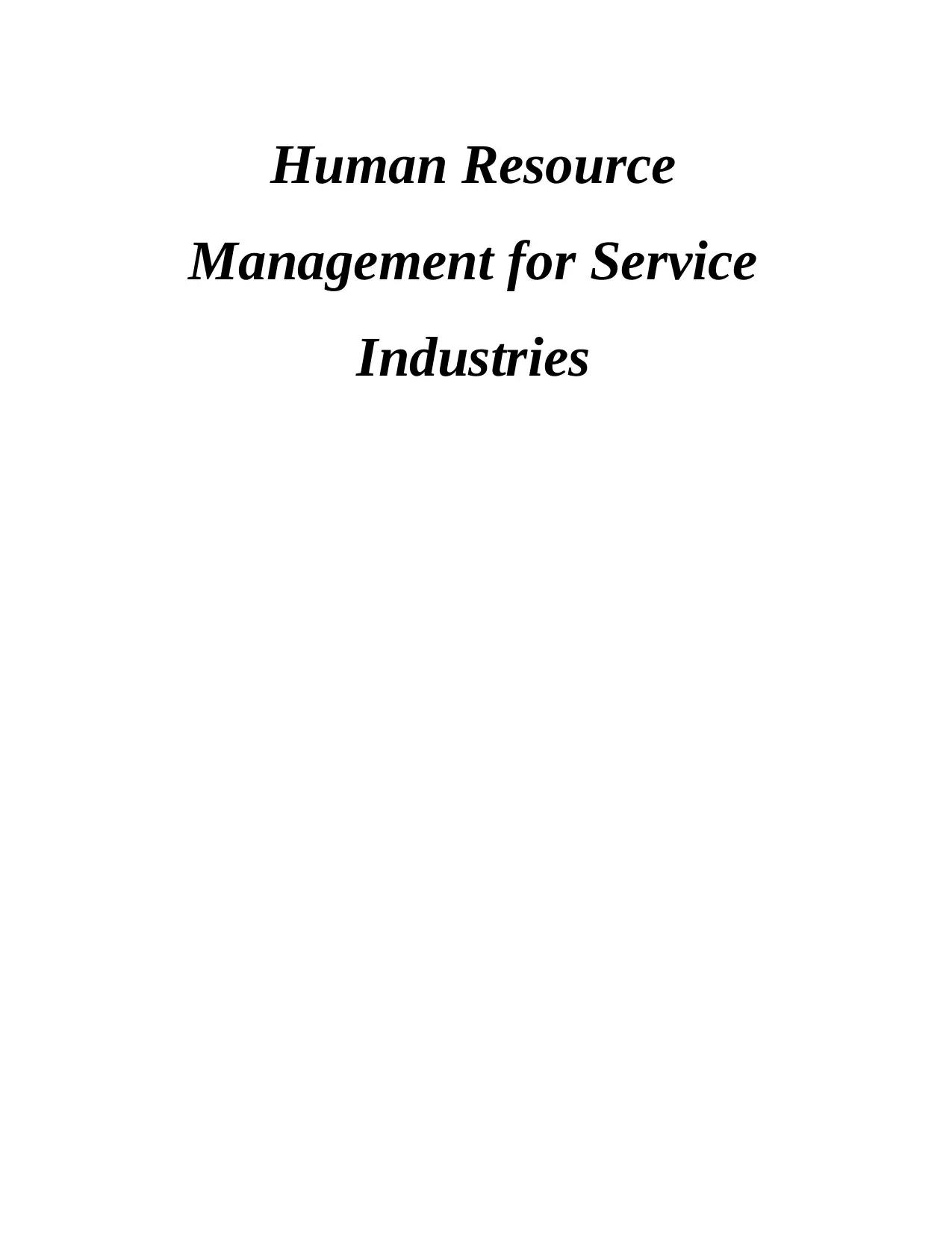
Human Resource
Management for Service
Industries
Management for Service
Industries
Paraphrase This Document
Need a fresh take? Get an instant paraphrase of this document with our AI Paraphraser
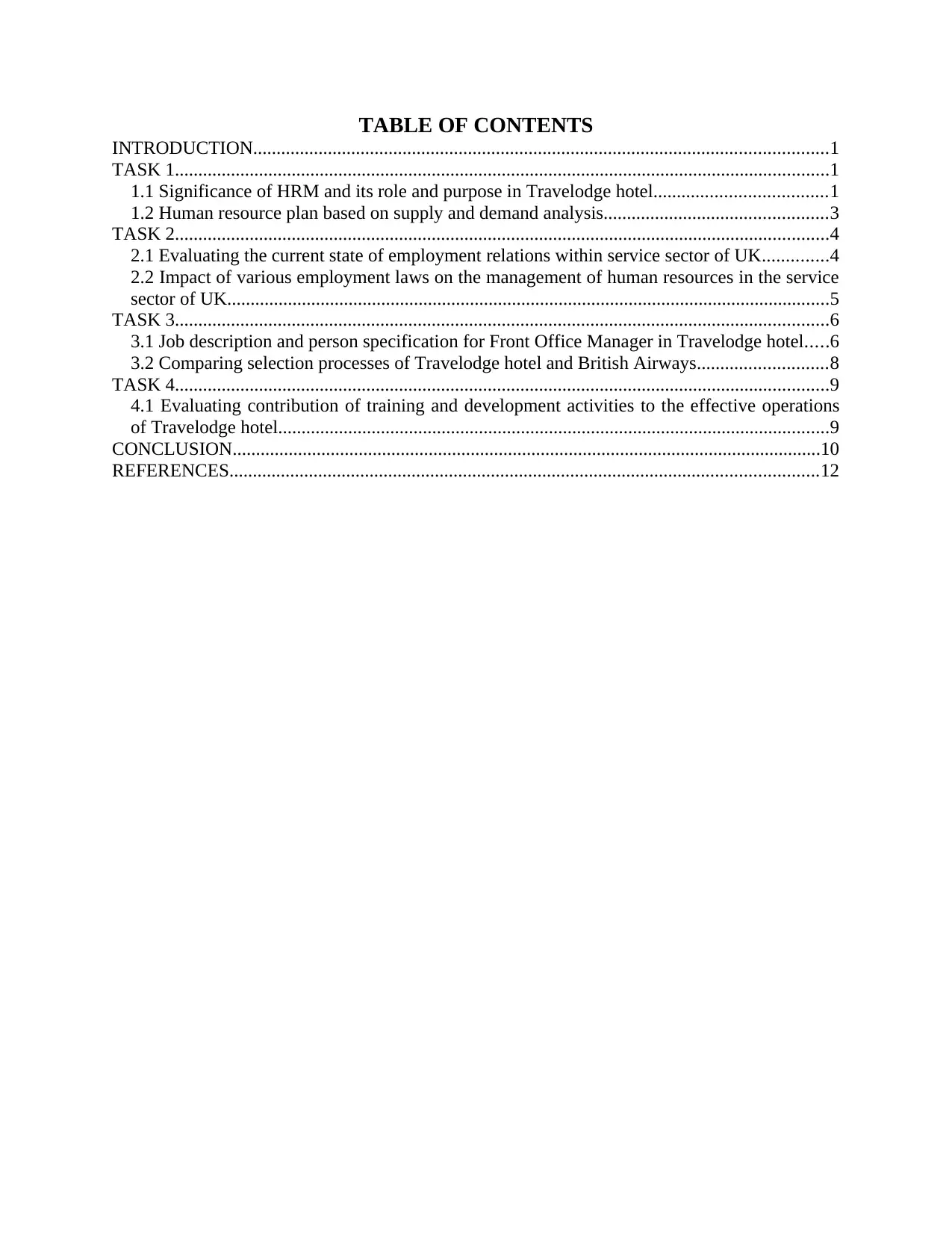
TABLE OF CONTENTS
INTRODUCTION...........................................................................................................................1
TASK 1............................................................................................................................................1
1.1 Significance of HRM and its role and purpose in Travelodge hotel.....................................1
1.2 Human resource plan based on supply and demand analysis................................................3
TASK 2............................................................................................................................................4
2.1 Evaluating the current state of employment relations within service sector of UK..............4
2.2 Impact of various employment laws on the management of human resources in the service
sector of UK.................................................................................................................................5
TASK 3............................................................................................................................................6
3.1 Job description and person specification for Front Office Manager in Travelodge hotel.....6
3.2 Comparing selection processes of Travelodge hotel and British Airways............................8
TASK 4............................................................................................................................................9
4.1 Evaluating contribution of training and development activities to the effective operations
of Travelodge hotel......................................................................................................................9
CONCLUSION..............................................................................................................................10
REFERENCES..............................................................................................................................12
INTRODUCTION...........................................................................................................................1
TASK 1............................................................................................................................................1
1.1 Significance of HRM and its role and purpose in Travelodge hotel.....................................1
1.2 Human resource plan based on supply and demand analysis................................................3
TASK 2............................................................................................................................................4
2.1 Evaluating the current state of employment relations within service sector of UK..............4
2.2 Impact of various employment laws on the management of human resources in the service
sector of UK.................................................................................................................................5
TASK 3............................................................................................................................................6
3.1 Job description and person specification for Front Office Manager in Travelodge hotel.....6
3.2 Comparing selection processes of Travelodge hotel and British Airways............................8
TASK 4............................................................................................................................................9
4.1 Evaluating contribution of training and development activities to the effective operations
of Travelodge hotel......................................................................................................................9
CONCLUSION..............................................................................................................................10
REFERENCES..............................................................................................................................12
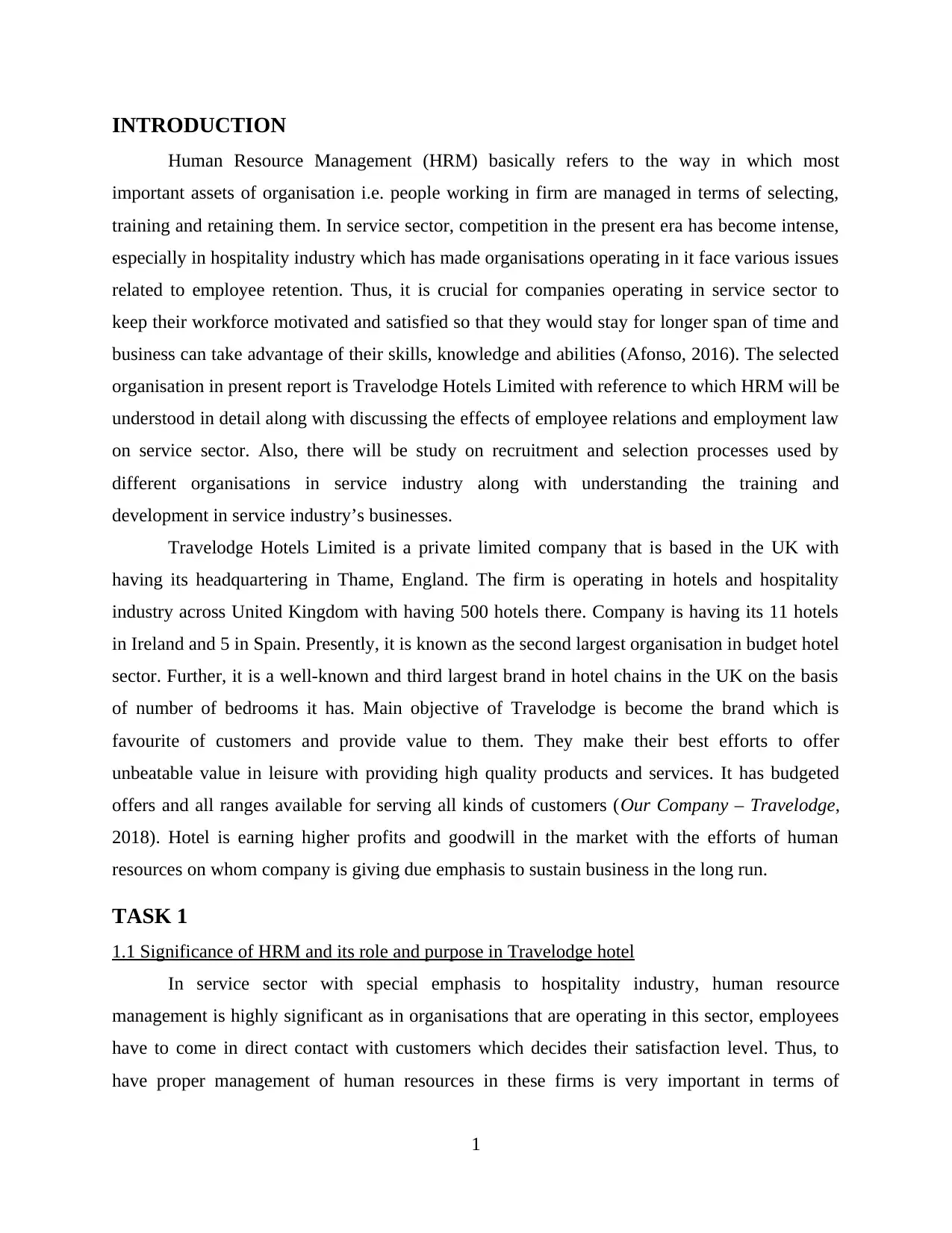
INTRODUCTION
Human Resource Management (HRM) basically refers to the way in which most
important assets of organisation i.e. people working in firm are managed in terms of selecting,
training and retaining them. In service sector, competition in the present era has become intense,
especially in hospitality industry which has made organisations operating in it face various issues
related to employee retention. Thus, it is crucial for companies operating in service sector to
keep their workforce motivated and satisfied so that they would stay for longer span of time and
business can take advantage of their skills, knowledge and abilities (Afonso, 2016). The selected
organisation in present report is Travelodge Hotels Limited with reference to which HRM will be
understood in detail along with discussing the effects of employee relations and employment law
on service sector. Also, there will be study on recruitment and selection processes used by
different organisations in service industry along with understanding the training and
development in service industry’s businesses.
Travelodge Hotels Limited is a private limited company that is based in the UK with
having its headquartering in Thame, England. The firm is operating in hotels and hospitality
industry across United Kingdom with having 500 hotels there. Company is having its 11 hotels
in Ireland and 5 in Spain. Presently, it is known as the second largest organisation in budget hotel
sector. Further, it is a well-known and third largest brand in hotel chains in the UK on the basis
of number of bedrooms it has. Main objective of Travelodge is become the brand which is
favourite of customers and provide value to them. They make their best efforts to offer
unbeatable value in leisure with providing high quality products and services. It has budgeted
offers and all ranges available for serving all kinds of customers (Our Company – Travelodge,
2018). Hotel is earning higher profits and goodwill in the market with the efforts of human
resources on whom company is giving due emphasis to sustain business in the long run.
TASK 1
1.1 Significance of HRM and its role and purpose in Travelodge hotel
In service sector with special emphasis to hospitality industry, human resource
management is highly significant as in organisations that are operating in this sector, employees
have to come in direct contact with customers which decides their satisfaction level. Thus, to
have proper management of human resources in these firms is very important in terms of
1
Human Resource Management (HRM) basically refers to the way in which most
important assets of organisation i.e. people working in firm are managed in terms of selecting,
training and retaining them. In service sector, competition in the present era has become intense,
especially in hospitality industry which has made organisations operating in it face various issues
related to employee retention. Thus, it is crucial for companies operating in service sector to
keep their workforce motivated and satisfied so that they would stay for longer span of time and
business can take advantage of their skills, knowledge and abilities (Afonso, 2016). The selected
organisation in present report is Travelodge Hotels Limited with reference to which HRM will be
understood in detail along with discussing the effects of employee relations and employment law
on service sector. Also, there will be study on recruitment and selection processes used by
different organisations in service industry along with understanding the training and
development in service industry’s businesses.
Travelodge Hotels Limited is a private limited company that is based in the UK with
having its headquartering in Thame, England. The firm is operating in hotels and hospitality
industry across United Kingdom with having 500 hotels there. Company is having its 11 hotels
in Ireland and 5 in Spain. Presently, it is known as the second largest organisation in budget hotel
sector. Further, it is a well-known and third largest brand in hotel chains in the UK on the basis
of number of bedrooms it has. Main objective of Travelodge is become the brand which is
favourite of customers and provide value to them. They make their best efforts to offer
unbeatable value in leisure with providing high quality products and services. It has budgeted
offers and all ranges available for serving all kinds of customers (Our Company – Travelodge,
2018). Hotel is earning higher profits and goodwill in the market with the efforts of human
resources on whom company is giving due emphasis to sustain business in the long run.
TASK 1
1.1 Significance of HRM and its role and purpose in Travelodge hotel
In service sector with special emphasis to hospitality industry, human resource
management is highly significant as in organisations that are operating in this sector, employees
have to come in direct contact with customers which decides their satisfaction level. Thus, to
have proper management of human resources in these firms is very important in terms of
1
⊘ This is a preview!⊘
Do you want full access?
Subscribe today to unlock all pages.

Trusted by 1+ million students worldwide
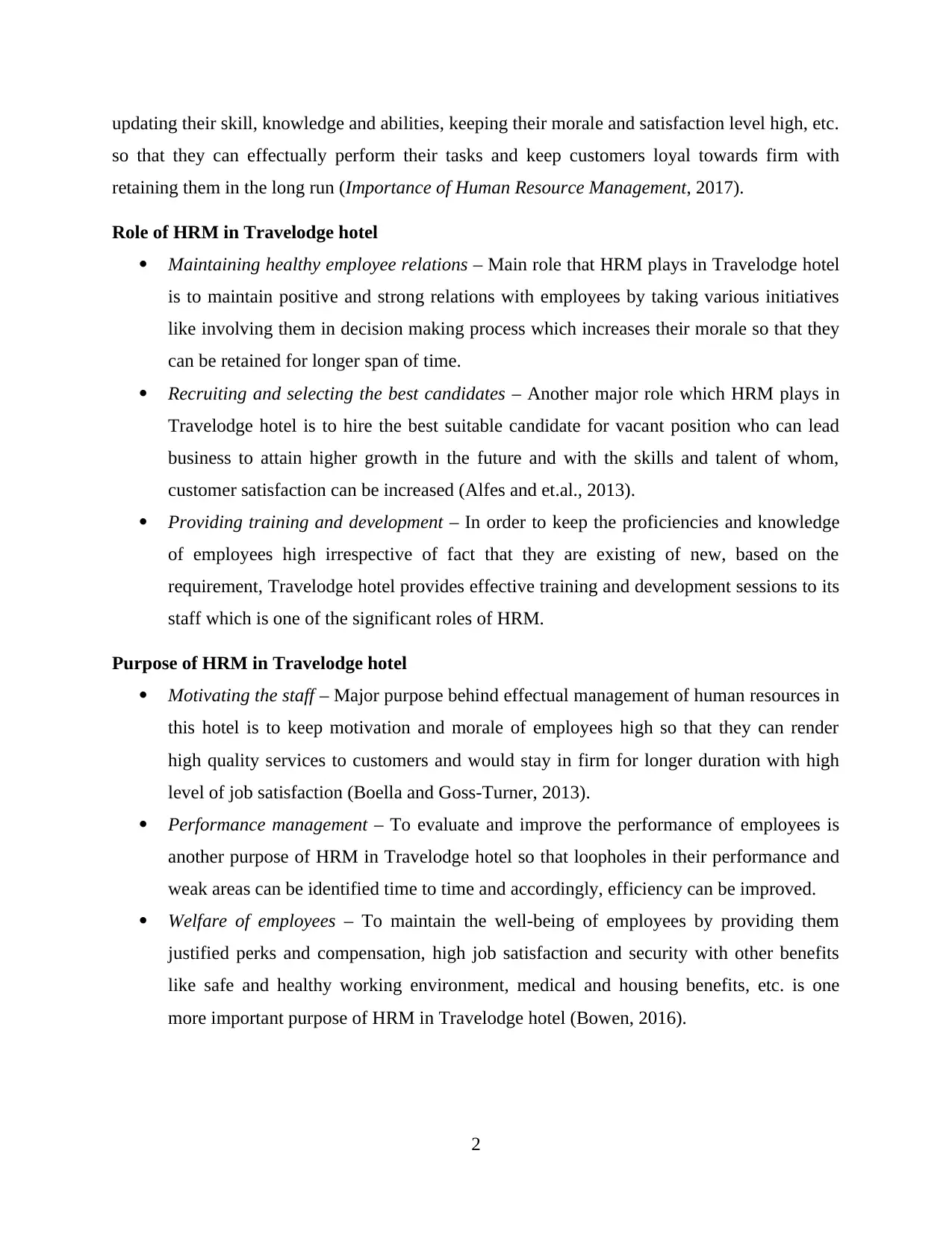
updating their skill, knowledge and abilities, keeping their morale and satisfaction level high, etc.
so that they can effectually perform their tasks and keep customers loyal towards firm with
retaining them in the long run (Importance of Human Resource Management, 2017).
Role of HRM in Travelodge hotel
Maintaining healthy employee relations – Main role that HRM plays in Travelodge hotel
is to maintain positive and strong relations with employees by taking various initiatives
like involving them in decision making process which increases their morale so that they
can be retained for longer span of time.
Recruiting and selecting the best candidates – Another major role which HRM plays in
Travelodge hotel is to hire the best suitable candidate for vacant position who can lead
business to attain higher growth in the future and with the skills and talent of whom,
customer satisfaction can be increased (Alfes and et.al., 2013).
Providing training and development – In order to keep the proficiencies and knowledge
of employees high irrespective of fact that they are existing of new, based on the
requirement, Travelodge hotel provides effective training and development sessions to its
staff which is one of the significant roles of HRM.
Purpose of HRM in Travelodge hotel
Motivating the staff – Major purpose behind effectual management of human resources in
this hotel is to keep motivation and morale of employees high so that they can render
high quality services to customers and would stay in firm for longer duration with high
level of job satisfaction (Boella and Goss-Turner, 2013).
Performance management – To evaluate and improve the performance of employees is
another purpose of HRM in Travelodge hotel so that loopholes in their performance and
weak areas can be identified time to time and accordingly, efficiency can be improved.
Welfare of employees – To maintain the well-being of employees by providing them
justified perks and compensation, high job satisfaction and security with other benefits
like safe and healthy working environment, medical and housing benefits, etc. is one
more important purpose of HRM in Travelodge hotel (Bowen, 2016).
2
so that they can effectually perform their tasks and keep customers loyal towards firm with
retaining them in the long run (Importance of Human Resource Management, 2017).
Role of HRM in Travelodge hotel
Maintaining healthy employee relations – Main role that HRM plays in Travelodge hotel
is to maintain positive and strong relations with employees by taking various initiatives
like involving them in decision making process which increases their morale so that they
can be retained for longer span of time.
Recruiting and selecting the best candidates – Another major role which HRM plays in
Travelodge hotel is to hire the best suitable candidate for vacant position who can lead
business to attain higher growth in the future and with the skills and talent of whom,
customer satisfaction can be increased (Alfes and et.al., 2013).
Providing training and development – In order to keep the proficiencies and knowledge
of employees high irrespective of fact that they are existing of new, based on the
requirement, Travelodge hotel provides effective training and development sessions to its
staff which is one of the significant roles of HRM.
Purpose of HRM in Travelodge hotel
Motivating the staff – Major purpose behind effectual management of human resources in
this hotel is to keep motivation and morale of employees high so that they can render
high quality services to customers and would stay in firm for longer duration with high
level of job satisfaction (Boella and Goss-Turner, 2013).
Performance management – To evaluate and improve the performance of employees is
another purpose of HRM in Travelodge hotel so that loopholes in their performance and
weak areas can be identified time to time and accordingly, efficiency can be improved.
Welfare of employees – To maintain the well-being of employees by providing them
justified perks and compensation, high job satisfaction and security with other benefits
like safe and healthy working environment, medical and housing benefits, etc. is one
more important purpose of HRM in Travelodge hotel (Bowen, 2016).
2
Paraphrase This Document
Need a fresh take? Get an instant paraphrase of this document with our AI Paraphraser
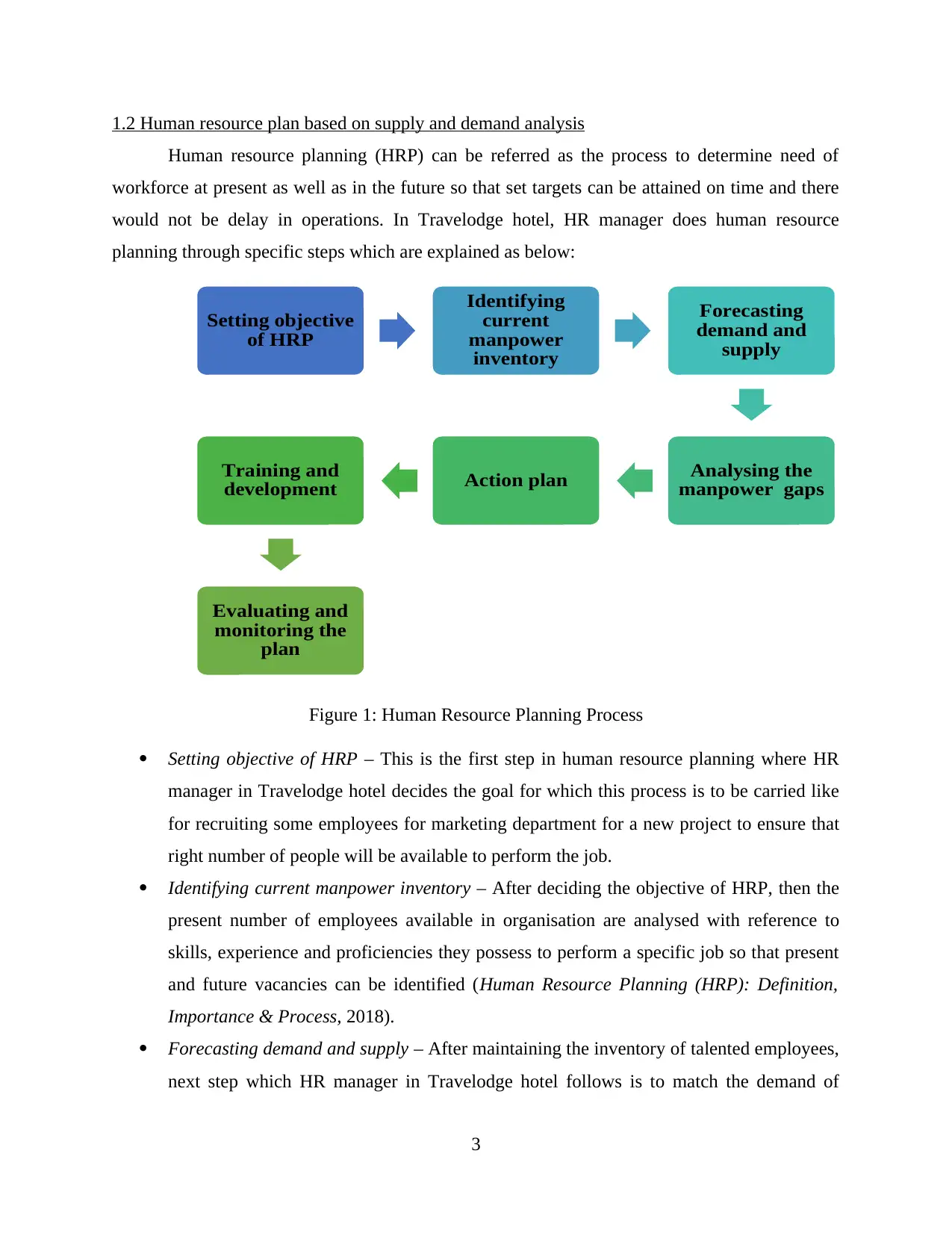
1.2 Human resource plan based on supply and demand analysis
Human resource planning (HRP) can be referred as the process to determine need of
workforce at present as well as in the future so that set targets can be attained on time and there
would not be delay in operations. In Travelodge hotel, HR manager does human resource
planning through specific steps which are explained as below:
Figure 1: Human Resource Planning Process
Setting objective of HRP – This is the first step in human resource planning where HR
manager in Travelodge hotel decides the goal for which this process is to be carried like
for recruiting some employees for marketing department for a new project to ensure that
right number of people will be available to perform the job.
Identifying current manpower inventory – After deciding the objective of HRP, then the
present number of employees available in organisation are analysed with reference to
skills, experience and proficiencies they possess to perform a specific job so that present
and future vacancies can be identified (Human Resource Planning (HRP): Definition,
Importance & Process, 2018).
Forecasting demand and supply – After maintaining the inventory of talented employees,
next step which HR manager in Travelodge hotel follows is to match the demand of
3
Setting objective
of HRP
Identifying
current
manpower
inventory
Forecasting
demand and
supply
Analysing the
manpower gaps
Action plan
Training and
development
Evaluating and
monitoring the
plan
Human resource planning (HRP) can be referred as the process to determine need of
workforce at present as well as in the future so that set targets can be attained on time and there
would not be delay in operations. In Travelodge hotel, HR manager does human resource
planning through specific steps which are explained as below:
Figure 1: Human Resource Planning Process
Setting objective of HRP – This is the first step in human resource planning where HR
manager in Travelodge hotel decides the goal for which this process is to be carried like
for recruiting some employees for marketing department for a new project to ensure that
right number of people will be available to perform the job.
Identifying current manpower inventory – After deciding the objective of HRP, then the
present number of employees available in organisation are analysed with reference to
skills, experience and proficiencies they possess to perform a specific job so that present
and future vacancies can be identified (Human Resource Planning (HRP): Definition,
Importance & Process, 2018).
Forecasting demand and supply – After maintaining the inventory of talented employees,
next step which HR manager in Travelodge hotel follows is to match the demand of
3
Setting objective
of HRP
Identifying
current
manpower
inventory
Forecasting
demand and
supply
Analysing the
manpower gaps
Action plan
Training and
development
Evaluating and
monitoring the
plan
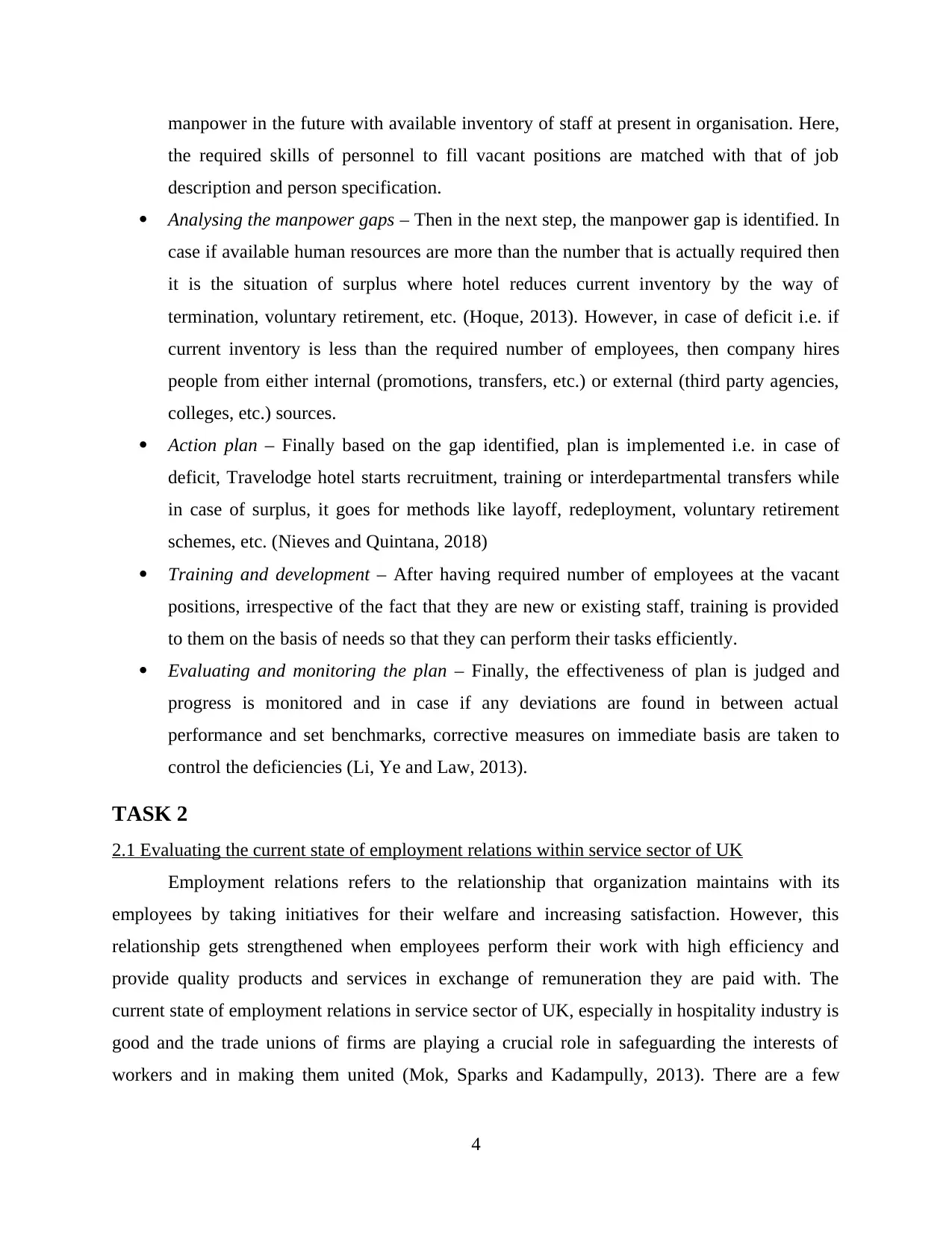
manpower in the future with available inventory of staff at present in organisation. Here,
the required skills of personnel to fill vacant positions are matched with that of job
description and person specification.
Analysing the manpower gaps – Then in the next step, the manpower gap is identified. In
case if available human resources are more than the number that is actually required then
it is the situation of surplus where hotel reduces current inventory by the way of
termination, voluntary retirement, etc. (Hoque, 2013). However, in case of deficit i.e. if
current inventory is less than the required number of employees, then company hires
people from either internal (promotions, transfers, etc.) or external (third party agencies,
colleges, etc.) sources.
Action plan – Finally based on the gap identified, plan is implemented i.e. in case of
deficit, Travelodge hotel starts recruitment, training or interdepartmental transfers while
in case of surplus, it goes for methods like layoff, redeployment, voluntary retirement
schemes, etc. (Nieves and Quintana, 2018)
Training and development – After having required number of employees at the vacant
positions, irrespective of the fact that they are new or existing staff, training is provided
to them on the basis of needs so that they can perform their tasks efficiently.
Evaluating and monitoring the plan – Finally, the effectiveness of plan is judged and
progress is monitored and in case if any deviations are found in between actual
performance and set benchmarks, corrective measures on immediate basis are taken to
control the deficiencies (Li, Ye and Law, 2013).
TASK 2
2.1 Evaluating the current state of employment relations within service sector of UK
Employment relations refers to the relationship that organization maintains with its
employees by taking initiatives for their welfare and increasing satisfaction. However, this
relationship gets strengthened when employees perform their work with high efficiency and
provide quality products and services in exchange of remuneration they are paid with. The
current state of employment relations in service sector of UK, especially in hospitality industry is
good and the trade unions of firms are playing a crucial role in safeguarding the interests of
workers and in making them united (Mok, Sparks and Kadampully, 2013). There are a few
4
the required skills of personnel to fill vacant positions are matched with that of job
description and person specification.
Analysing the manpower gaps – Then in the next step, the manpower gap is identified. In
case if available human resources are more than the number that is actually required then
it is the situation of surplus where hotel reduces current inventory by the way of
termination, voluntary retirement, etc. (Hoque, 2013). However, in case of deficit i.e. if
current inventory is less than the required number of employees, then company hires
people from either internal (promotions, transfers, etc.) or external (third party agencies,
colleges, etc.) sources.
Action plan – Finally based on the gap identified, plan is implemented i.e. in case of
deficit, Travelodge hotel starts recruitment, training or interdepartmental transfers while
in case of surplus, it goes for methods like layoff, redeployment, voluntary retirement
schemes, etc. (Nieves and Quintana, 2018)
Training and development – After having required number of employees at the vacant
positions, irrespective of the fact that they are new or existing staff, training is provided
to them on the basis of needs so that they can perform their tasks efficiently.
Evaluating and monitoring the plan – Finally, the effectiveness of plan is judged and
progress is monitored and in case if any deviations are found in between actual
performance and set benchmarks, corrective measures on immediate basis are taken to
control the deficiencies (Li, Ye and Law, 2013).
TASK 2
2.1 Evaluating the current state of employment relations within service sector of UK
Employment relations refers to the relationship that organization maintains with its
employees by taking initiatives for their welfare and increasing satisfaction. However, this
relationship gets strengthened when employees perform their work with high efficiency and
provide quality products and services in exchange of remuneration they are paid with. The
current state of employment relations in service sector of UK, especially in hospitality industry is
good and the trade unions of firms are playing a crucial role in safeguarding the interests of
workers and in making them united (Mok, Sparks and Kadampully, 2013). There are a few
4
⊘ This is a preview!⊘
Do you want full access?
Subscribe today to unlock all pages.

Trusted by 1+ million students worldwide
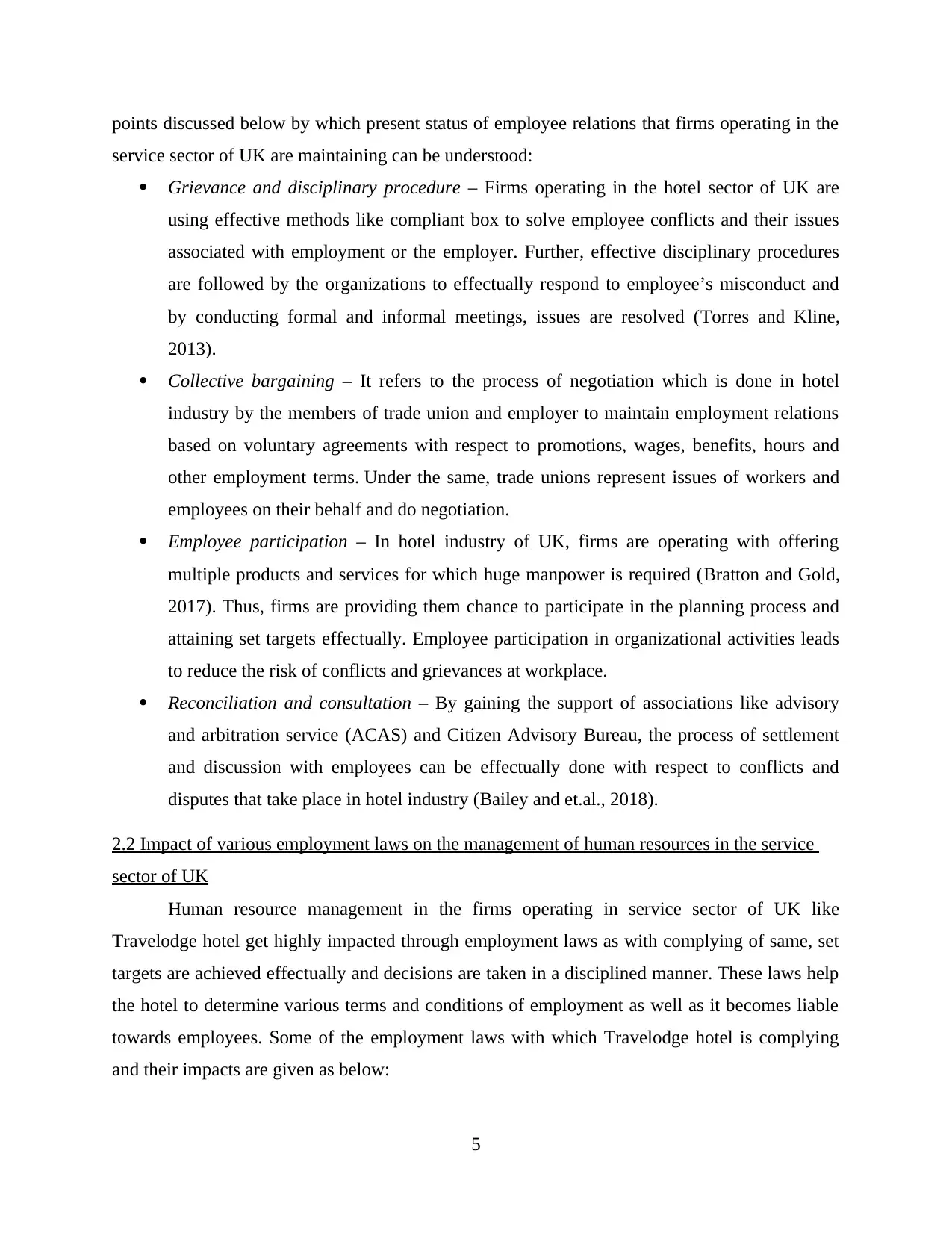
points discussed below by which present status of employee relations that firms operating in the
service sector of UK are maintaining can be understood:
Grievance and disciplinary procedure – Firms operating in the hotel sector of UK are
using effective methods like compliant box to solve employee conflicts and their issues
associated with employment or the employer. Further, effective disciplinary procedures
are followed by the organizations to effectually respond to employee’s misconduct and
by conducting formal and informal meetings, issues are resolved (Torres and Kline,
2013).
Collective bargaining – It refers to the process of negotiation which is done in hotel
industry by the members of trade union and employer to maintain employment relations
based on voluntary agreements with respect to promotions, wages, benefits, hours and
other employment terms. Under the same, trade unions represent issues of workers and
employees on their behalf and do negotiation.
Employee participation – In hotel industry of UK, firms are operating with offering
multiple products and services for which huge manpower is required (Bratton and Gold,
2017). Thus, firms are providing them chance to participate in the planning process and
attaining set targets effectually. Employee participation in organizational activities leads
to reduce the risk of conflicts and grievances at workplace.
Reconciliation and consultation – By gaining the support of associations like advisory
and arbitration service (ACAS) and Citizen Advisory Bureau, the process of settlement
and discussion with employees can be effectually done with respect to conflicts and
disputes that take place in hotel industry (Bailey and et.al., 2018).
2.2 Impact of various employment laws on the management of human resources in the service
sector of UK
Human resource management in the firms operating in service sector of UK like
Travelodge hotel get highly impacted through employment laws as with complying of same, set
targets are achieved effectually and decisions are taken in a disciplined manner. These laws help
the hotel to determine various terms and conditions of employment as well as it becomes liable
towards employees. Some of the employment laws with which Travelodge hotel is complying
and their impacts are given as below:
5
service sector of UK are maintaining can be understood:
Grievance and disciplinary procedure – Firms operating in the hotel sector of UK are
using effective methods like compliant box to solve employee conflicts and their issues
associated with employment or the employer. Further, effective disciplinary procedures
are followed by the organizations to effectually respond to employee’s misconduct and
by conducting formal and informal meetings, issues are resolved (Torres and Kline,
2013).
Collective bargaining – It refers to the process of negotiation which is done in hotel
industry by the members of trade union and employer to maintain employment relations
based on voluntary agreements with respect to promotions, wages, benefits, hours and
other employment terms. Under the same, trade unions represent issues of workers and
employees on their behalf and do negotiation.
Employee participation – In hotel industry of UK, firms are operating with offering
multiple products and services for which huge manpower is required (Bratton and Gold,
2017). Thus, firms are providing them chance to participate in the planning process and
attaining set targets effectually. Employee participation in organizational activities leads
to reduce the risk of conflicts and grievances at workplace.
Reconciliation and consultation – By gaining the support of associations like advisory
and arbitration service (ACAS) and Citizen Advisory Bureau, the process of settlement
and discussion with employees can be effectually done with respect to conflicts and
disputes that take place in hotel industry (Bailey and et.al., 2018).
2.2 Impact of various employment laws on the management of human resources in the service
sector of UK
Human resource management in the firms operating in service sector of UK like
Travelodge hotel get highly impacted through employment laws as with complying of same, set
targets are achieved effectually and decisions are taken in a disciplined manner. These laws help
the hotel to determine various terms and conditions of employment as well as it becomes liable
towards employees. Some of the employment laws with which Travelodge hotel is complying
and their impacts are given as below:
5
Paraphrase This Document
Need a fresh take? Get an instant paraphrase of this document with our AI Paraphraser
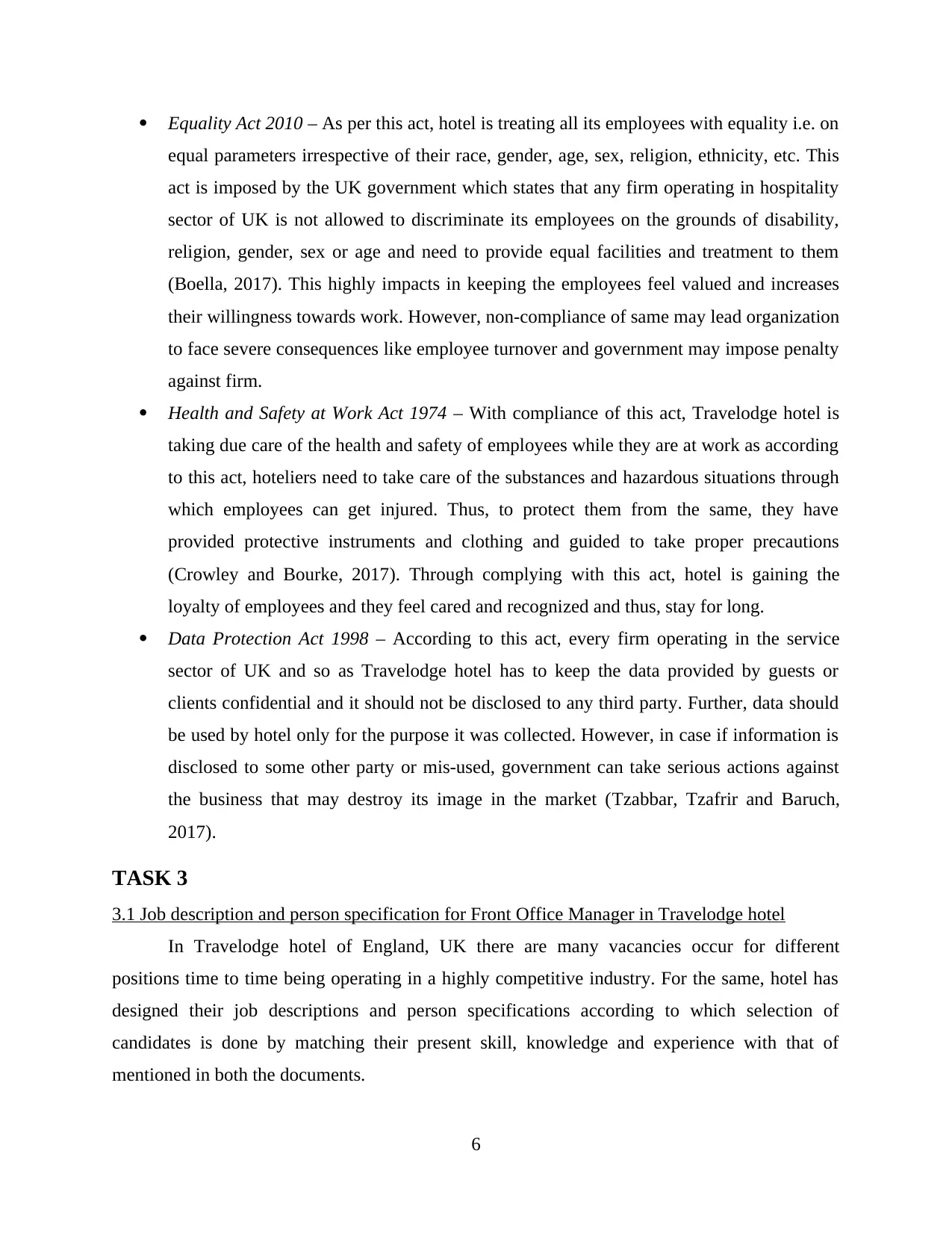
Equality Act 2010 – As per this act, hotel is treating all its employees with equality i.e. on
equal parameters irrespective of their race, gender, age, sex, religion, ethnicity, etc. This
act is imposed by the UK government which states that any firm operating in hospitality
sector of UK is not allowed to discriminate its employees on the grounds of disability,
religion, gender, sex or age and need to provide equal facilities and treatment to them
(Boella, 2017). This highly impacts in keeping the employees feel valued and increases
their willingness towards work. However, non-compliance of same may lead organization
to face severe consequences like employee turnover and government may impose penalty
against firm.
Health and Safety at Work Act 1974 – With compliance of this act, Travelodge hotel is
taking due care of the health and safety of employees while they are at work as according
to this act, hoteliers need to take care of the substances and hazardous situations through
which employees can get injured. Thus, to protect them from the same, they have
provided protective instruments and clothing and guided to take proper precautions
(Crowley and Bourke, 2017). Through complying with this act, hotel is gaining the
loyalty of employees and they feel cared and recognized and thus, stay for long.
Data Protection Act 1998 – According to this act, every firm operating in the service
sector of UK and so as Travelodge hotel has to keep the data provided by guests or
clients confidential and it should not be disclosed to any third party. Further, data should
be used by hotel only for the purpose it was collected. However, in case if information is
disclosed to some other party or mis-used, government can take serious actions against
the business that may destroy its image in the market (Tzabbar, Tzafrir and Baruch,
2017).
TASK 3
3.1 Job description and person specification for Front Office Manager in Travelodge hotel
In Travelodge hotel of England, UK there are many vacancies occur for different
positions time to time being operating in a highly competitive industry. For the same, hotel has
designed their job descriptions and person specifications according to which selection of
candidates is done by matching their present skill, knowledge and experience with that of
mentioned in both the documents.
6
equal parameters irrespective of their race, gender, age, sex, religion, ethnicity, etc. This
act is imposed by the UK government which states that any firm operating in hospitality
sector of UK is not allowed to discriminate its employees on the grounds of disability,
religion, gender, sex or age and need to provide equal facilities and treatment to them
(Boella, 2017). This highly impacts in keeping the employees feel valued and increases
their willingness towards work. However, non-compliance of same may lead organization
to face severe consequences like employee turnover and government may impose penalty
against firm.
Health and Safety at Work Act 1974 – With compliance of this act, Travelodge hotel is
taking due care of the health and safety of employees while they are at work as according
to this act, hoteliers need to take care of the substances and hazardous situations through
which employees can get injured. Thus, to protect them from the same, they have
provided protective instruments and clothing and guided to take proper precautions
(Crowley and Bourke, 2017). Through complying with this act, hotel is gaining the
loyalty of employees and they feel cared and recognized and thus, stay for long.
Data Protection Act 1998 – According to this act, every firm operating in the service
sector of UK and so as Travelodge hotel has to keep the data provided by guests or
clients confidential and it should not be disclosed to any third party. Further, data should
be used by hotel only for the purpose it was collected. However, in case if information is
disclosed to some other party or mis-used, government can take serious actions against
the business that may destroy its image in the market (Tzabbar, Tzafrir and Baruch,
2017).
TASK 3
3.1 Job description and person specification for Front Office Manager in Travelodge hotel
In Travelodge hotel of England, UK there are many vacancies occur for different
positions time to time being operating in a highly competitive industry. For the same, hotel has
designed their job descriptions and person specifications according to which selection of
candidates is done by matching their present skill, knowledge and experience with that of
mentioned in both the documents.
6
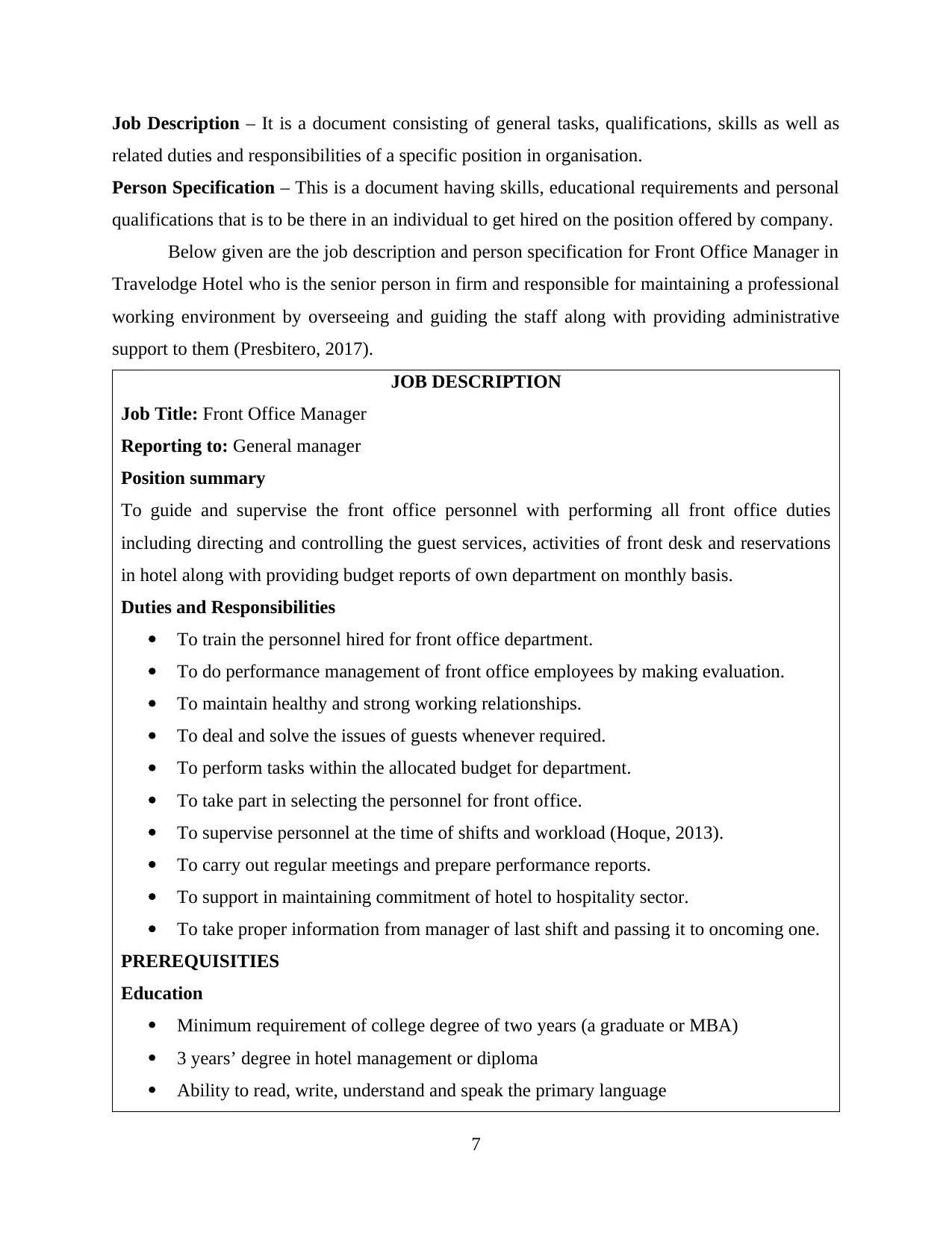
Job Description – It is a document consisting of general tasks, qualifications, skills as well as
related duties and responsibilities of a specific position in organisation.
Person Specification – This is a document having skills, educational requirements and personal
qualifications that is to be there in an individual to get hired on the position offered by company.
Below given are the job description and person specification for Front Office Manager in
Travelodge Hotel who is the senior person in firm and responsible for maintaining a professional
working environment by overseeing and guiding the staff along with providing administrative
support to them (Presbitero, 2017).
JOB DESCRIPTION
Job Title: Front Office Manager
Reporting to: General manager
Position summary
To guide and supervise the front office personnel with performing all front office duties
including directing and controlling the guest services, activities of front desk and reservations
in hotel along with providing budget reports of own department on monthly basis.
Duties and Responsibilities
To train the personnel hired for front office department.
To do performance management of front office employees by making evaluation.
To maintain healthy and strong working relationships.
To deal and solve the issues of guests whenever required.
To perform tasks within the allocated budget for department.
To take part in selecting the personnel for front office.
To supervise personnel at the time of shifts and workload (Hoque, 2013).
To carry out regular meetings and prepare performance reports.
To support in maintaining commitment of hotel to hospitality sector.
To take proper information from manager of last shift and passing it to oncoming one.
PREREQUISITIES
Education
Minimum requirement of college degree of two years (a graduate or MBA)
3 years’ degree in hotel management or diploma
Ability to read, write, understand and speak the primary language
7
related duties and responsibilities of a specific position in organisation.
Person Specification – This is a document having skills, educational requirements and personal
qualifications that is to be there in an individual to get hired on the position offered by company.
Below given are the job description and person specification for Front Office Manager in
Travelodge Hotel who is the senior person in firm and responsible for maintaining a professional
working environment by overseeing and guiding the staff along with providing administrative
support to them (Presbitero, 2017).
JOB DESCRIPTION
Job Title: Front Office Manager
Reporting to: General manager
Position summary
To guide and supervise the front office personnel with performing all front office duties
including directing and controlling the guest services, activities of front desk and reservations
in hotel along with providing budget reports of own department on monthly basis.
Duties and Responsibilities
To train the personnel hired for front office department.
To do performance management of front office employees by making evaluation.
To maintain healthy and strong working relationships.
To deal and solve the issues of guests whenever required.
To perform tasks within the allocated budget for department.
To take part in selecting the personnel for front office.
To supervise personnel at the time of shifts and workload (Hoque, 2013).
To carry out regular meetings and prepare performance reports.
To support in maintaining commitment of hotel to hospitality sector.
To take proper information from manager of last shift and passing it to oncoming one.
PREREQUISITIES
Education
Minimum requirement of college degree of two years (a graduate or MBA)
3 years’ degree in hotel management or diploma
Ability to read, write, understand and speak the primary language
7
⊘ This is a preview!⊘
Do you want full access?
Subscribe today to unlock all pages.

Trusted by 1+ million students worldwide
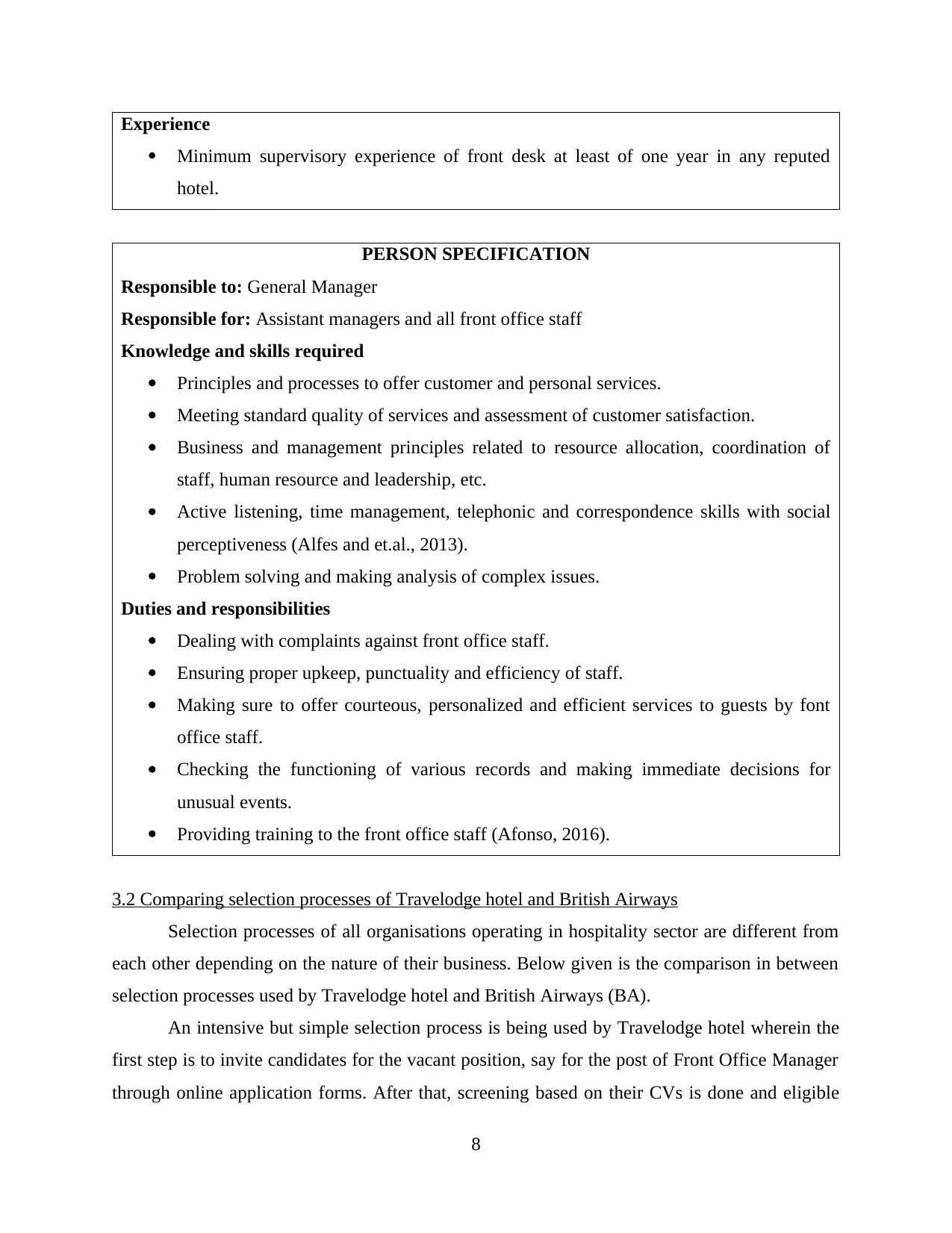
Experience
Minimum supervisory experience of front desk at least of one year in any reputed
hotel.
PERSON SPECIFICATION
Responsible to: General Manager
Responsible for: Assistant managers and all front office staff
Knowledge and skills required
Principles and processes to offer customer and personal services.
Meeting standard quality of services and assessment of customer satisfaction.
Business and management principles related to resource allocation, coordination of
staff, human resource and leadership, etc.
Active listening, time management, telephonic and correspondence skills with social
perceptiveness (Alfes and et.al., 2013).
Problem solving and making analysis of complex issues.
Duties and responsibilities
Dealing with complaints against front office staff.
Ensuring proper upkeep, punctuality and efficiency of staff.
Making sure to offer courteous, personalized and efficient services to guests by font
office staff.
Checking the functioning of various records and making immediate decisions for
unusual events.
Providing training to the front office staff (Afonso, 2016).
3.2 Comparing selection processes of Travelodge hotel and British Airways
Selection processes of all organisations operating in hospitality sector are different from
each other depending on the nature of their business. Below given is the comparison in between
selection processes used by Travelodge hotel and British Airways (BA).
An intensive but simple selection process is being used by Travelodge hotel wherein the
first step is to invite candidates for the vacant position, say for the post of Front Office Manager
through online application forms. After that, screening based on their CVs is done and eligible
8
Minimum supervisory experience of front desk at least of one year in any reputed
hotel.
PERSON SPECIFICATION
Responsible to: General Manager
Responsible for: Assistant managers and all front office staff
Knowledge and skills required
Principles and processes to offer customer and personal services.
Meeting standard quality of services and assessment of customer satisfaction.
Business and management principles related to resource allocation, coordination of
staff, human resource and leadership, etc.
Active listening, time management, telephonic and correspondence skills with social
perceptiveness (Alfes and et.al., 2013).
Problem solving and making analysis of complex issues.
Duties and responsibilities
Dealing with complaints against front office staff.
Ensuring proper upkeep, punctuality and efficiency of staff.
Making sure to offer courteous, personalized and efficient services to guests by font
office staff.
Checking the functioning of various records and making immediate decisions for
unusual events.
Providing training to the front office staff (Afonso, 2016).
3.2 Comparing selection processes of Travelodge hotel and British Airways
Selection processes of all organisations operating in hospitality sector are different from
each other depending on the nature of their business. Below given is the comparison in between
selection processes used by Travelodge hotel and British Airways (BA).
An intensive but simple selection process is being used by Travelodge hotel wherein the
first step is to invite candidates for the vacant position, say for the post of Front Office Manager
through online application forms. After that, screening based on their CVs is done and eligible
8
Paraphrase This Document
Need a fresh take? Get an instant paraphrase of this document with our AI Paraphraser
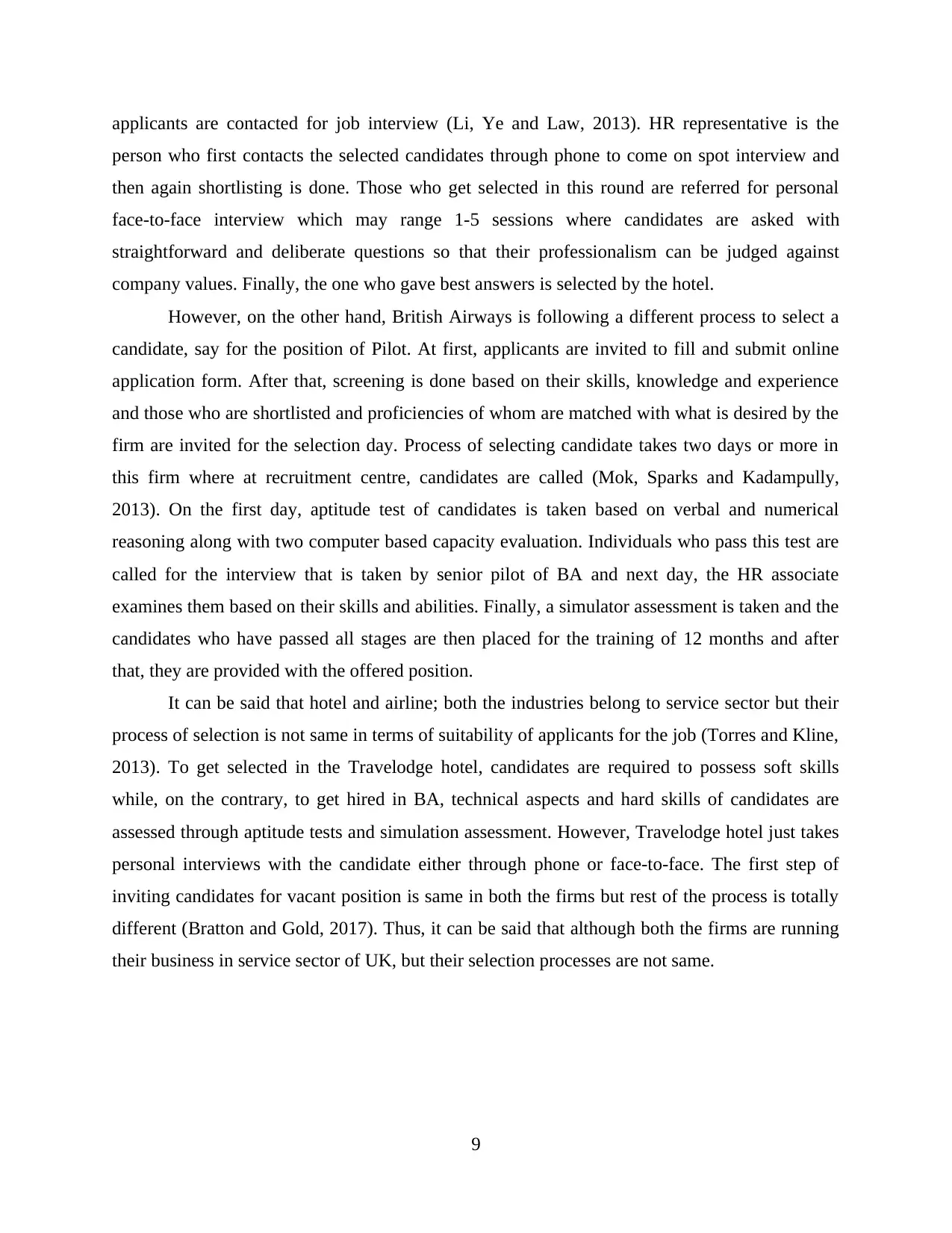
applicants are contacted for job interview (Li, Ye and Law, 2013). HR representative is the
person who first contacts the selected candidates through phone to come on spot interview and
then again shortlisting is done. Those who get selected in this round are referred for personal
face-to-face interview which may range 1-5 sessions where candidates are asked with
straightforward and deliberate questions so that their professionalism can be judged against
company values. Finally, the one who gave best answers is selected by the hotel.
However, on the other hand, British Airways is following a different process to select a
candidate, say for the position of Pilot. At first, applicants are invited to fill and submit online
application form. After that, screening is done based on their skills, knowledge and experience
and those who are shortlisted and proficiencies of whom are matched with what is desired by the
firm are invited for the selection day. Process of selecting candidate takes two days or more in
this firm where at recruitment centre, candidates are called (Mok, Sparks and Kadampully,
2013). On the first day, aptitude test of candidates is taken based on verbal and numerical
reasoning along with two computer based capacity evaluation. Individuals who pass this test are
called for the interview that is taken by senior pilot of BA and next day, the HR associate
examines them based on their skills and abilities. Finally, a simulator assessment is taken and the
candidates who have passed all stages are then placed for the training of 12 months and after
that, they are provided with the offered position.
It can be said that hotel and airline; both the industries belong to service sector but their
process of selection is not same in terms of suitability of applicants for the job (Torres and Kline,
2013). To get selected in the Travelodge hotel, candidates are required to possess soft skills
while, on the contrary, to get hired in BA, technical aspects and hard skills of candidates are
assessed through aptitude tests and simulation assessment. However, Travelodge hotel just takes
personal interviews with the candidate either through phone or face-to-face. The first step of
inviting candidates for vacant position is same in both the firms but rest of the process is totally
different (Bratton and Gold, 2017). Thus, it can be said that although both the firms are running
their business in service sector of UK, but their selection processes are not same.
9
person who first contacts the selected candidates through phone to come on spot interview and
then again shortlisting is done. Those who get selected in this round are referred for personal
face-to-face interview which may range 1-5 sessions where candidates are asked with
straightforward and deliberate questions so that their professionalism can be judged against
company values. Finally, the one who gave best answers is selected by the hotel.
However, on the other hand, British Airways is following a different process to select a
candidate, say for the position of Pilot. At first, applicants are invited to fill and submit online
application form. After that, screening is done based on their skills, knowledge and experience
and those who are shortlisted and proficiencies of whom are matched with what is desired by the
firm are invited for the selection day. Process of selecting candidate takes two days or more in
this firm where at recruitment centre, candidates are called (Mok, Sparks and Kadampully,
2013). On the first day, aptitude test of candidates is taken based on verbal and numerical
reasoning along with two computer based capacity evaluation. Individuals who pass this test are
called for the interview that is taken by senior pilot of BA and next day, the HR associate
examines them based on their skills and abilities. Finally, a simulator assessment is taken and the
candidates who have passed all stages are then placed for the training of 12 months and after
that, they are provided with the offered position.
It can be said that hotel and airline; both the industries belong to service sector but their
process of selection is not same in terms of suitability of applicants for the job (Torres and Kline,
2013). To get selected in the Travelodge hotel, candidates are required to possess soft skills
while, on the contrary, to get hired in BA, technical aspects and hard skills of candidates are
assessed through aptitude tests and simulation assessment. However, Travelodge hotel just takes
personal interviews with the candidate either through phone or face-to-face. The first step of
inviting candidates for vacant position is same in both the firms but rest of the process is totally
different (Bratton and Gold, 2017). Thus, it can be said that although both the firms are running
their business in service sector of UK, but their selection processes are not same.
9
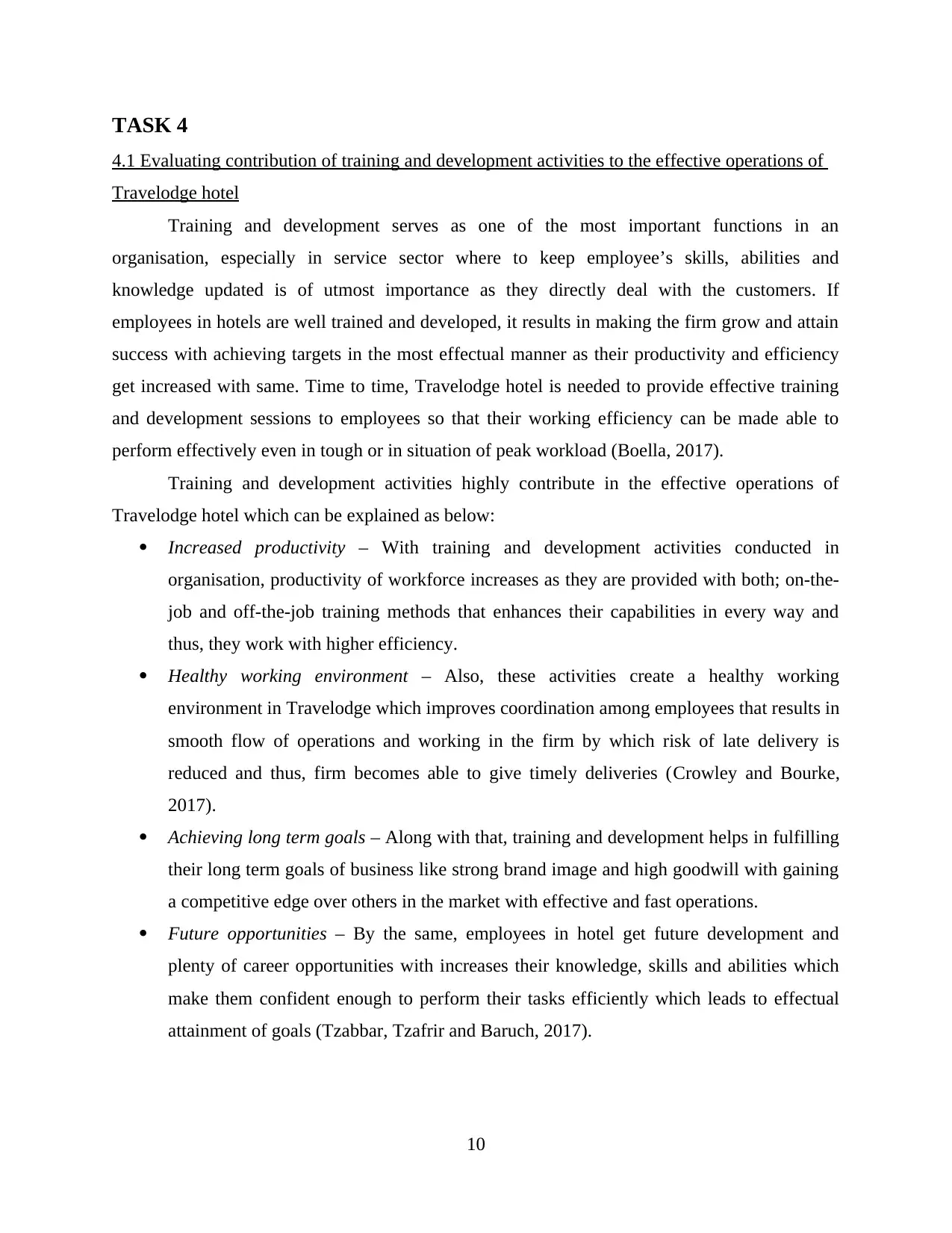
TASK 4
4.1 Evaluating contribution of training and development activities to the effective operations of
Travelodge hotel
Training and development serves as one of the most important functions in an
organisation, especially in service sector where to keep employee’s skills, abilities and
knowledge updated is of utmost importance as they directly deal with the customers. If
employees in hotels are well trained and developed, it results in making the firm grow and attain
success with achieving targets in the most effectual manner as their productivity and efficiency
get increased with same. Time to time, Travelodge hotel is needed to provide effective training
and development sessions to employees so that their working efficiency can be made able to
perform effectively even in tough or in situation of peak workload (Boella, 2017).
Training and development activities highly contribute in the effective operations of
Travelodge hotel which can be explained as below:
Increased productivity – With training and development activities conducted in
organisation, productivity of workforce increases as they are provided with both; on-the-
job and off-the-job training methods that enhances their capabilities in every way and
thus, they work with higher efficiency.
Healthy working environment – Also, these activities create a healthy working
environment in Travelodge which improves coordination among employees that results in
smooth flow of operations and working in the firm by which risk of late delivery is
reduced and thus, firm becomes able to give timely deliveries (Crowley and Bourke,
2017).
Achieving long term goals – Along with that, training and development helps in fulfilling
their long term goals of business like strong brand image and high goodwill with gaining
a competitive edge over others in the market with effective and fast operations.
Future opportunities – By the same, employees in hotel get future development and
plenty of career opportunities with increases their knowledge, skills and abilities which
make them confident enough to perform their tasks efficiently which leads to effectual
attainment of goals (Tzabbar, Tzafrir and Baruch, 2017).
10
4.1 Evaluating contribution of training and development activities to the effective operations of
Travelodge hotel
Training and development serves as one of the most important functions in an
organisation, especially in service sector where to keep employee’s skills, abilities and
knowledge updated is of utmost importance as they directly deal with the customers. If
employees in hotels are well trained and developed, it results in making the firm grow and attain
success with achieving targets in the most effectual manner as their productivity and efficiency
get increased with same. Time to time, Travelodge hotel is needed to provide effective training
and development sessions to employees so that their working efficiency can be made able to
perform effectively even in tough or in situation of peak workload (Boella, 2017).
Training and development activities highly contribute in the effective operations of
Travelodge hotel which can be explained as below:
Increased productivity – With training and development activities conducted in
organisation, productivity of workforce increases as they are provided with both; on-the-
job and off-the-job training methods that enhances their capabilities in every way and
thus, they work with higher efficiency.
Healthy working environment – Also, these activities create a healthy working
environment in Travelodge which improves coordination among employees that results in
smooth flow of operations and working in the firm by which risk of late delivery is
reduced and thus, firm becomes able to give timely deliveries (Crowley and Bourke,
2017).
Achieving long term goals – Along with that, training and development helps in fulfilling
their long term goals of business like strong brand image and high goodwill with gaining
a competitive edge over others in the market with effective and fast operations.
Future opportunities – By the same, employees in hotel get future development and
plenty of career opportunities with increases their knowledge, skills and abilities which
make them confident enough to perform their tasks efficiently which leads to effectual
attainment of goals (Tzabbar, Tzafrir and Baruch, 2017).
10
⊘ This is a preview!⊘
Do you want full access?
Subscribe today to unlock all pages.

Trusted by 1+ million students worldwide
1 out of 14
Related Documents
Your All-in-One AI-Powered Toolkit for Academic Success.
+13062052269
info@desklib.com
Available 24*7 on WhatsApp / Email
![[object Object]](/_next/static/media/star-bottom.7253800d.svg)
Unlock your academic potential
Copyright © 2020–2025 A2Z Services. All Rights Reserved. Developed and managed by ZUCOL.


